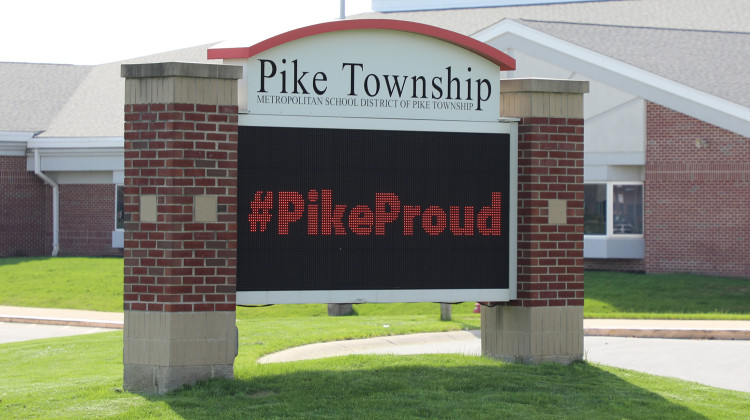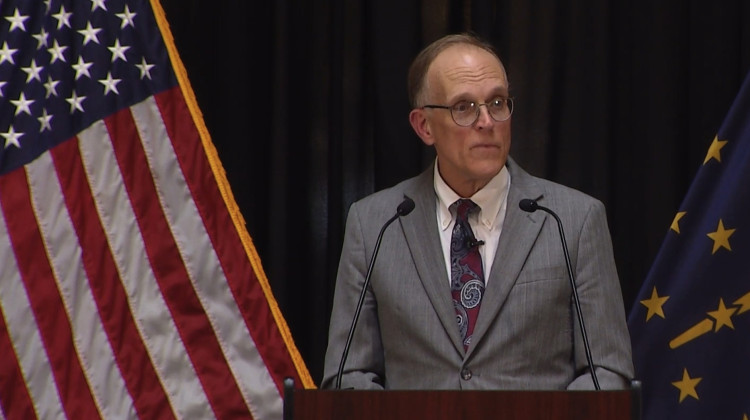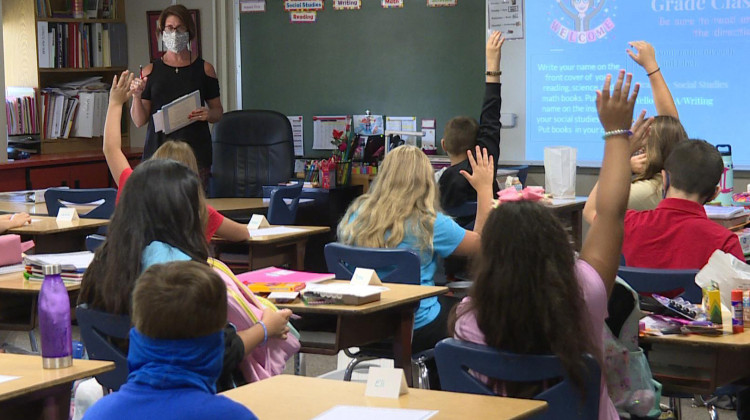
Pike Township Schools' property tax referendum on the May 7 primary ballot would generate $116 million over eight years if it is approved by voters.
Eric Weddle / WFYIThe Metropolitan School District of Pike Township is among four Indiana school districts asking voters to pass property tax increases on the May 7 primary ballot.
If approved, the bulk of the new funds will go toward educator and staff salaries at each district over the next eight years.
And if voters ratify the referendum for Pike Township, more than a dozen charter schools in Marion County could receive a share of the local taxes as required by a 2023 law.
Levy proposals from Fremont Community Schools in Steuben County and Brown County School Corp. follow referenda rejected by each community in recent past elections. Blue River Valley School Corp. will seek the first referendum in Henry County.
All district leaders say failure to pass the local property tax increases will lead to cuts in staff and academic programs.
“Teacher and staff layoffs will have a negative impact on families and our local economy,” Fremont schools warned in a presentation, adding that extracurricular programs would also be reduced. “Veteran teachers and staff will leave to work in other school districts or leave education altogether.”
Robert Taylor, the executive director of the Indiana Association of Public School Superintendents, said a proposed referendum and the response by voters are unique to that particular school and the community.
“In almost every case, a referendum is initiated as a result of the need in the school,” he said.
Pike’s $14.5 million referendum
Pike Superintendent Larry Young said the time arrived for the district to ask voters for a $14.5 million tax referendum to support teacher pay and academic programs. Pike is the last of the 11 Marion County school districts to seek a referendum.
In 2010 a community-initiated petition triggered a $21.4 million referendum for the district to raze and reconstruct Guion Creek Elementary School. It passed with 69 percent of the vote.
Young said the May referendum would provide new local funds into three areas: teacher and staff pay, student academic support, and safety.
Like most Indiana school districts, Pike used federal pandemic stimulus funds to cover COVID-19-related expenses and help make up for the instruction students missed out on due to disruptions. As Pikes’ nearly $37 million in aid comes to an end, district leaders want to maintain academic supports built from the temporary funds. Such as interventionists who work alongside classroom teachers to support students need help grasping vital skills.
“We had to create that additional time, but we had to create it within the school day,” Young said of the need to support struggling students who fell behind during the pandemic. “And that's what our interventionists and our other instructional staff do.”
The referendum would support $4.5 million toward these and other academic programs previously covered by the federal aid known as Elementary and Secondary School Emergency Relief or ESSER.
Most of the annual referendum, $9 million, would go toward teacher pay, benefits, and recruitment. The starting teacher salary at Pike is $50,000, which is just above the average in the county but some nearby districts offer more. Wayne Township pays $52,500 for first-year teachers, and in Brownsburg, it’s $51,500.
“Our educators should be compensated, you know, at a competitive rate. That's what our children need in Pike Township,” Young said. “That's what they deserve.”
The referendum comes more than two years after parents and teachers revolted against the former superintendent following fights over staff compensation and transportation mishaps that led to students not getting to school.
Eventually, the superintendent left the district and Young, a Pike graduate and long-time administrator, was picked as the new leader in June 2022.
“I’m really pleased and proud that since I've taken over as superintendent we're headed in the right direction,” Young said. “But just like every other school district, we need to have the funds to ensure that we're doing what we need to do for the next generation.”
If voters approve the referendum, Pike Township will be the first district in the state required to share a porition of the property-tax revenue with charter schools. Charter schools, which are publicly funded but independently managed, don’t typically receive property tax revenue in Indiana.
A 2023 law allows charter schools that enroll students who live in the boundary of a Marion County school district to receive a per-student portion of the funds. Charter schools are under numerous requirements to be eligible, including sharing in the cost of promoting the referendum.
Fifteen charter schools notified Pike of their intent to opt in. If all schools remain eligible an estimated total of $412,000 of the local property-tax funds would be shared among them annually.
Young said the district is not actively coordinating with any charter school operators to promote the referendum
How does a property tax referendum work?
Many school districts rely on additional funds from local property-tax referenda to consistently finance teachers, staff, and academic programs. This follows the change by state leaders to primarily finance schools through state revenue generated by sales taxes, individual income tax, and other levies as of 2009.
Indiana imposes caps on property taxes based on assessed value rates according to property type: 1 percent for owner-occupied homes, 2 percent for other residential properties and farmland, and 3 percent for all other property. However, if voters approve a local referendum, property tax bills can surpass the cap, with the surplus taxes directed to the local school district.
Here are the local public questions for school referenda on the May 7 ballot. The totals for operation levies are based on the net assessed valuation of taxable property in the district boundary earlier this year. The value can change.
Blue River Valley School Corporation, Henry County
- Property tax rate: $0.19 per $100 assessed value for eight years
- Total revenue over eight years: $2,876,752
- How $359,594 of annual revenue will be spent: Teacher and staff salaries, attracting new staff.
Brown County School Corp., Brown County
- Renewal of a property tax rate previously approved in 2016: $0.10 per $100 assessed value for eight years. The current rate is $0.08.
- Total revenue over eight years: $15,032,408
- How $1,879,051 of annual revenue will be spent: Teacher and staff salaries, benefits ($1,691,146); Career resource center ($187,905).
Fremont Community Schools, Steuben County
- Renewal of a property tax rate previously approved in 2015: $0.15 per $100 assessed value for eight years. The current rate is $0.1963.
- Total revenue over eight years: $19,077,752
- How $2,384,719 of annual revenue will be spent: Retraining and attracting teachers and staff ($1,660,525), academic programs ($424,194), and operations ($300,000).
MSD Pike Township, Marion County
- Property tax rate: $0.24 per $100 assessed value for eight years
- Total revenue over eight years: $116,000,000
- How $14,500,000 of annual revenue will be spent: Salaries and benefits for approximately 57 staff members including teachers, social workers, and counselors, plus staff recruitment and technology for learning loss ($4,500,000); Staff wages, retention, recruitment, and professional development ($9,000,000); Additional school resource officers, other security personnel and safety equipment ($1,000,000).
Contact WFYI Marion County education reporter Sydney Dauphinais at sdauphinais@wfyi.org.
Eric Weddle is the WFYI education editor. Contact Eric at eweddle@wfyi.org.
 DONATE
DONATE








 View More Programs
View More Programs

 Support WFYI. We can't do it without you.
Support WFYI. We can't do it without you.